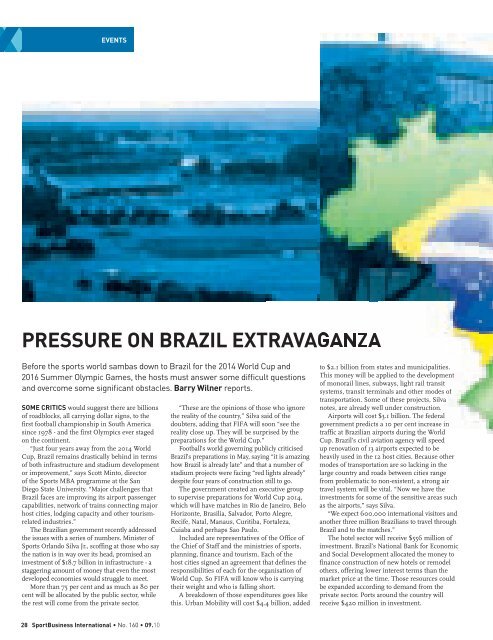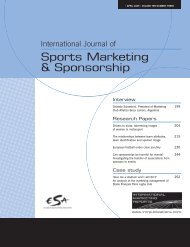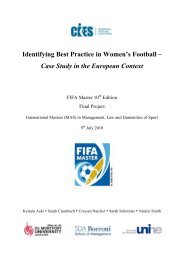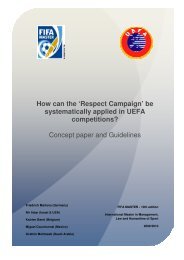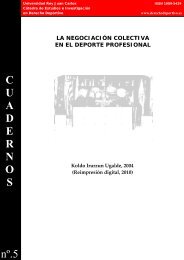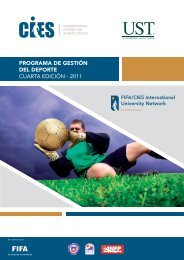4 - FIFA/CIES International University Network
4 - FIFA/CIES International University Network
4 - FIFA/CIES International University Network
You also want an ePaper? Increase the reach of your titles
YUMPU automatically turns print PDFs into web optimized ePapers that Google loves.
EVENTS<br />
PRESSURE ON BRAZIL EXTRAVAGANZA<br />
Before the sports world sambas down to Brazil for the 2014 World Cup and<br />
2016 Summer Olympic Games, the hosts must answer some difficult questions<br />
and overcome some significant obstacles. Barry Wilner reports.<br />
SOME CRITICS would suggest there are billions<br />
of roadblocks, all carrying dollar signs, to the<br />
first football championship in South America<br />
since 1978 - and the first Olympics ever staged<br />
on the continent.<br />
“Just four years away from the 2014 World<br />
Cup, Brazil remains drastically behind in terms<br />
of both infrastructure and stadium development<br />
or improvement,” says Scott Minto, director<br />
of the Sports MBA programme at the San<br />
Diego State <strong>University</strong>. “Major challenges that<br />
Brazil faces are improving its airport passenger<br />
capabilities, network of trains connecting major<br />
host cities, lodging capacity and other tourismrelated<br />
industries.”<br />
The Brazilian government recently addressed<br />
the issues with a series of numbers. Minister of<br />
Sports Orlando Silva Jr., scoffing at those who say<br />
the nation is in way over its head, promised an<br />
investment of $18.7 billion in infrastructure - a<br />
staggering amount of money that even the most<br />
developed economies would struggle to meet.<br />
More than 75 per cent and as much as 80 per<br />
cent will be allocated by the public sector, while<br />
the rest will come from the private sector.<br />
“These are the opinions of those who ignore<br />
the reality of the country,” Silva said of the<br />
doubters, adding that <strong>FIFA</strong> will soon “see the<br />
reality close up. They will be surprised by the<br />
preparations for the World Cup.”<br />
Football’s world governing publicly criticised<br />
Brazil’s preparations in May, saying “it is amazing<br />
how Brazil is already late” and that a number of<br />
stadium projects were facing “red lights already”<br />
despite four years of construction still to go.<br />
The government created an executive group<br />
to supervise preparations for World Cup 2014,<br />
which will have matches in Rio de Janeiro, Belo<br />
Horizonte, Brasilia, Salvador, Porto Alegre,<br />
Recife, Natal, Manaus, Curitiba, Fortaleza,<br />
Cuiaba and perhaps Sao Paulo.<br />
Included are representatives of the Office of<br />
the Chief of Staff and the ministries of sports,<br />
planning, finance and tourism. Each of the<br />
host cities signed an agreement that defines the<br />
responsibilities of each for the organisation of<br />
World Cup. So <strong>FIFA</strong> will know who is carrying<br />
their weight and who is falling short.<br />
A breakdown of those expenditures goes like<br />
this. Urban Mobility will cost $4.4 billion, added<br />
to $2.1 billion from states and municipalities.<br />
This money will be applied to the development<br />
of monorail lines, subways, light rail transit<br />
systems, transit terminals and other modes of<br />
transportation. Some of these projects, Silva<br />
notes, are already well under construction.<br />
Airports will cost $3.1 billion. The federal<br />
government predicts a 10 per cent increase in<br />
traffic at Brazilian airports during the World<br />
Cup. Brazil’s civil aviation agency will speed<br />
up renovation of 13 airports expected to be<br />
heavily used in the 12 host cities. Because other<br />
modes of transportation are so lacking in the<br />
large country and roads between cities range<br />
from problematic to non-existent, a strong air<br />
travel system will be vital. “Now we have the<br />
investments for some of the sensitive areas such<br />
as the airports,” says Silva.<br />
“We expect 600,000 international visitors and<br />
another three million Brazilians to travel through<br />
Brazil and to the matches.”<br />
The hotel sector will receive $556 million of<br />
investment. Brazil’s National Bank for Economic<br />
and Social Development allocated the money to<br />
finance construction of new hotels or remodel<br />
others, offering lower interest terms than the<br />
market price at the time. Those resources could<br />
be expanded according to demand from the<br />
private sector. Ports around the country will<br />
receive $420 million in investment.<br />
28 SportBusiness <strong>International</strong> • No. 160 • 09.10


